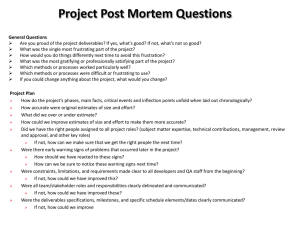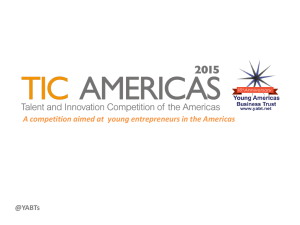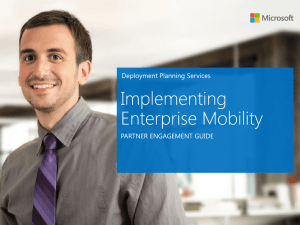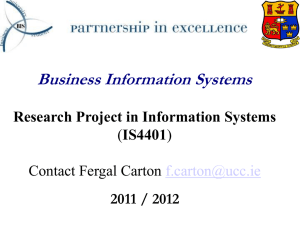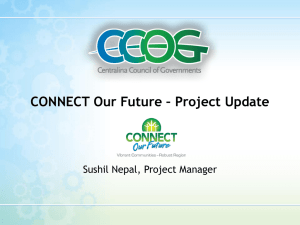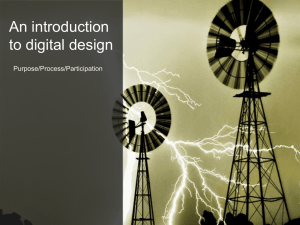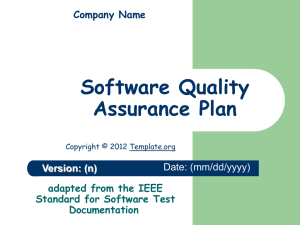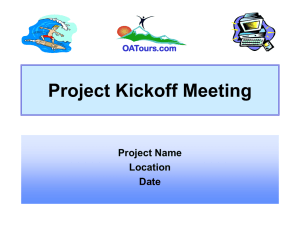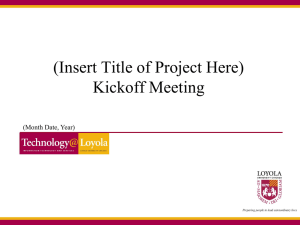Project Manager
advertisement
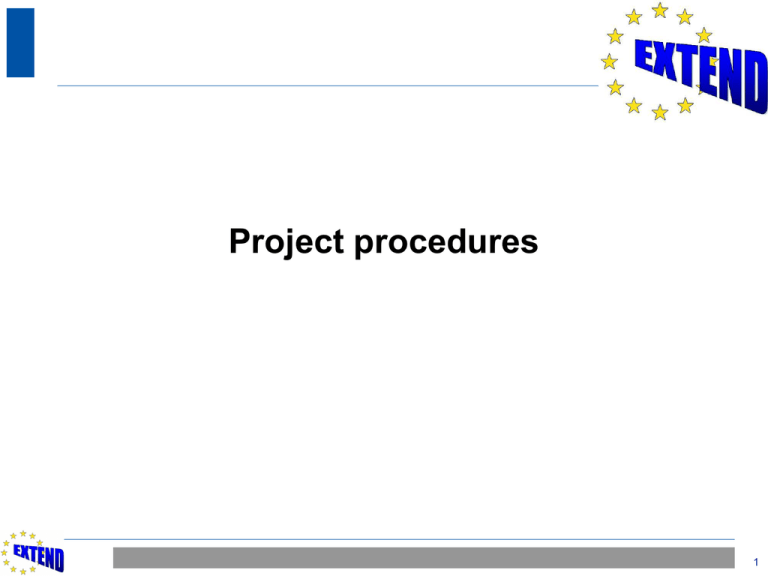
Project procedures 1 Issues addressed Overall project structure Project roles • Project Manager • Scientific Co-ordinator • WP leaders • Partners Internal project committees • General Assembly • Management Committee External advisory groups Project procedures • Preparation of deliverables • Quality control • Communication process • Meetings • Reporting 2 Overall project structure GENERAL ASSEMBLY Authorised representatives of all partners Management Committee Franco Malerba; Nicoletta Corrocher (UB) Yannis Caloghirou, Nicholas Vonortas, Aimilia Protogerou (NTUA), Maria Legal, Soumi Papadopoulou (PLANET), Maureen McKelvey (IMIT), Slavo Radosevic (UC)L Project Manager Scientific Co-ordinator Maria Legal (PLANET) Franco Malerba (UB) Work-package Leaders Project Partners 3 Project Roles Project Manager Scientific Co-ordinator WP leaders Partners 4 Project Manager (PM): role and responsibilities Contact point of project co-ordinator for all project partners Sole contact point vis a vis the European Commission for all issues • All requests by the EC for the project (or concerning specific partners) will be directed via the project manager • All requests by partners related to contractual issues should be performed via the project manager 5 Project Manager (PM): role and responsibilities cont’d Overall co-ordination of project execution in terms of contractual & administrative issues i.e. • Monitors compliance of partners with their obligations under the Grant Agreement (GA; contract) and consortium agreement (CA) • Oversees the implementation of amendments to the GA or CA (if/when required) • Reviews that deliverables are consistent with the Description of Work • Monitors the day-to-day implementation of project work plan (in consultation with Scientific Co-ordinator) • Submits deliverables according to timeplan • Aims to ensure smooth inter-partner co-operation • Organizes project meetings and reviews (develops agendas, minutes and action plans) • Identifies key risks to the project and counter-measures • Disseminates key project results to EC policy-makers Financial management of project in close collaboration with the appointed financial manager : • Submission of financial statements (prepared by partners) • Receipt of EU financial contributions and distribution among project partners in accordance with Annex I • Informing the Commission on the distribution of funds to partners 6 Scientific Co-ordinator (SC): role & responsibilities Co-ordinator of the scientific / research activities of the project: • Ensures that scientific objectives of the project are met • Ensures the high quality of project results according to DoW Consults the Scientific Coordination Committee on key scientific issues e.g. technical implementation risks etc. Key responsibilities: • Monitoring of scientific progress through the development of technical work-plans per semester (in collaboration with work-package leaders) • Identification of synergies between work-packages and relevant actions • Monitoring the activities of work-package leaders • Final quality control of all technical project deliverables • Synchronization and integration of results achieved at project level • Reporting of scientific progress to Project Manager and Scientific Coordination Committee • Scientific organisation of workshops and final project conference (foreseen in WP8) • Disseminates key project results to EC policy-makers 7 Work-package Leaders: Roles & Responsibilities Work-package Leaders shall co-ordinate the implementation of activities in their respective work-package. Responsibilities include: • Develop WP-specific action-plans (per trimester) determining required actions/inputs from involved partners in order to produce intermediate results and deliverables • Monitor closely (on a day-to-day basis) implementation of actionplans • Co-ordinate the communication (e.g. by email, concalls, meetings) between partners involved in the work-package. • Consult the Scientific Co-ordinator on key scientific issues, potential risks and deviations from plan (in cc: always also the Project Manager) • Monitor WP progress and report to the Scientific Co-ordinator and Project Manager (e.g. in Progress Reports). • Integrate all inputs and edit draft and final deliverables prior to forwarding to the Scientific Co-ordinator and Project Manager 8 Partners: Role & Responsibilities All project partners are required to carry out the project jointly and severally vis a vis the European Commision taking all necessary actions to ensure the project is carried out in accordance with the contract (Grant Agreement). Each partner should: • Carry out the work to be performed as identified in the Description of Work (Annex I) • Ensure that tasks assigned are correctly and timely performed i.e. deliver requested inputs on time and at the expected quality. • Document its activities in 6-monthly interim reports • Inform promptly the Project Manager any change in its legal name, address, name of legal representative and any change with regard to its legal / organizational status • Inform the Project Manager on any event, potential risk/problem which may affect the implementation of the project • Take part in project meetings and review meetings (with the EC) • Disseminate the projects’ results to the research community and public • Abide to fundamental ethical principles and avoid any conflicts of interest 9 Partners: Role & Responsibilities (cont’d) Each partner has identified a key contact person who is the principle person of contact for the organisation in terms of the: • scientific, contractual and in some cases financial issues (if a separate financial contact person does not exist). The Scientific Co-ordinator and the Project Manager shall communicate with the contact person at a first instance for specific issues pertaining to the partner. List of contact details for all partners is maintained by Project Coordinator 10 Internal project committees General Assembly Management Committee 11 General Assembly The General Assembly consists of one authorized representative per partner (and optional deputy) . The Assembly is in charge of managing all high-level decisions related to the Grant Agreement (contract) and Consortium Agreement e.g. • Amendments to the terms of the Grant Agreement or Consortium Agreement • Decisions on accession of new partners or termination of existing partner’s participation • Re-allocation of project budget among work packages or budget transfers among partners • Decisions on significant changes in work-packages 12 General Assembly: decision-making mechanisms High-level decisions require unanimity by all partners. If unanimity is not achieved, a General Assembly can be called again within 30 days where a decision can be taken by a majority of 75% of votes Other issues require a simple majority of two-thirds. The Assembly is called and chaired by the Project Manager when deemed necessary or requested by a partner. For urgent or minor decisions, decisions can be taken via teleconference meetings followed by written consent (sent by fax to the Project Manager). 13 Management Committee The Management Committee (MC) will monitor the overall progress of the project. It will: • Achievement of scheduled milestones and project objectives • Identify risks/problems and appropriate measures • Oversee the process of external refereeing of key project deliverables by the external advisory groups • Review Progress Reports and Periodic Reports • Dissemination and exploitation of project results The MC will be chaired by the Scientific Co-ordinator and Project Manager and will meet every 6 months or when needed. Members will interact also via conference calls and electronic mail. 14 Project Procedures Preparation of deliverables Quality control Knowledge management Communication process Meetings 15 Procedure for preparation of deliverables All deliverables should use the standard TEMPLATE for deliverables (to be used also for outlines and drafts) WP leader should develop an initial structure (proposal) of the deliverable and indicative distribution of sections among partners Once the structure and allocation is agreed among partners involved, the WP leader will monitor the smooth collection of all inputs. • if internal WP meetings / workshops are needed, these shall be organised by the WP leader in a location convenient to all partners, in consultation with the Scientific Coordinator and Project Manager Each deliverable shall be integrated, finalized and edited by the WP Leader. Subsequently, the WP Leader shall forward it to the Scientific Co-ordinator (cc: Project Manager) at least 3 weeks prior to the deadline who will initiate the process for internal or external review as appropriate (see next slides). 16 Classification of review level for deliverables All deliverables shall be reviewed internally by another partner with relevant know-how e.g. WP leader of another WP: mainly drafts and deliverables that are not critical or “parts” of subsequent reports The Scientific Co-ordinator and the Project Manager will develop a list with review level classification for all deliverables, which shall be made known to all project partners • This list will indicate apart from the review level also the names of internal (within the project) or external reviewers. 17 Internal review of deliverables (quality control) Deliverables that require internal review shall be reviewed by the designated internal reviewers (project partner with relevant know-how) • at least 3 weeks prior to deadline submission and returned back to the WP leader at least 10 days prior to the deadline. The WP leader should send the final version of deliverables 3 days prior to deadline (to the Project Manager and Scientific Coordinator). 18 Knowledge Management and document repository All deliverables and other background material shall be made available to project partners via a web-based tool WP Leaders will have the ability to upload documents to the repository (with a username & password) The Project Manager will ensure that all final versions of deliverables (as submitted to the EC) are uploaded Moreover, all major reports and research results will be made publicly available through the project website (to be monitored by the Scientific Co-ordinator) 19 Communication via the project mailing list Every project should use two emailing lists: 1. A technical project mailing list to be used by persons who are involved in the scientific/technical implementation of the project are included 2. A project mailing list to be used by partners when they wish to address an issue affecting all project partners. The Project Manager and Scientific Coordinator shall use this mailing list for issues pertaining to all partners (e.g. preparation of plenary meetings, distribution of minutes etc.) 20 Bilateral, intra-WP electronic communication WP leaders are responsible for co-ordinating intra-WP communication means. (Via “informal” mailing lists per work-package). In order to ensure the smooth co-operation and development of “communication history”, ALL bilateral, intra-WP and other email communications should have the Project Manager copied in cc, even on apparently minor issues; 21 Communication via conference calls Telephone conference calls can be organised among project partners (e.g. among workpackage partners, members of the Scientific Coordination Committee). Brief minutes should be distributed by the WP leader (or other designated person) via email to: • the affected partners and • the Scientific Coordinator • and Project Manager 22 Project meetings and Reviews Plenary project meetings (involving all partners) will be organised approximately every 6 months at a different location It is important that all partners are present at plenary meetings, even if they do not have an active role in the given period. The Project Manager shall distribute: • the agenda at least 2 weeks prior to meetings • minutes & action plan within 10 days after meetings Other meetings e.g. intra-WP workshops can be organised if considered necessary. THIS WILL BE CLARIFIED WITH THE Project Officer: Annual reviews may be be held for the evaluation of the project’ progress by the EC 23 Reporting PERIODIC REPORTS will be submitted to the Commission at the end of each reporting period (usually every 12 months) Detailed presentation on preparation of financial statements (to be included in periodic reports) follows in part 2 of the presentation on “Financial Management”. In order to monitor the progress of the project, 6-monthly interim progress reports shall be prepared: • All partners are required to record their activities and effort (in person-months) per work-package 24 Project Management Manual The roles and procedures shall be documented in an easy-to-use project management manual (internal document), that is being prepared by project manager. The descriptions are in line with the: • provisions of the Grant Agreement (Annex II – General Conditions) • Consortium Agreement 25 Financial Management 26 Issues addressed Financial Issues • Payment mechanisms • Guarantee Fund • Financial Statements • Eligible – Non eligible expenses • Important Notes • Certificates • Reporting Requirements 27 Payment Mechanisms (1) Pre financing shall be paid to the coordinator within 45 days following the date of entry into force of the grant agreement 5% of total Community Funding paid as a contribution to the Guarantee Fund Interim Payments • Corresponding to the costs accepted for the period • Payments until 10% retention is reached Final Payment • Including reimbursement of the 5% contribution from the guarantee fund • Taking into account the declaration of receipts at participant level 28 Payment mechanisms (2) Commission has 105 days to evaluate and execute the corresponding payment • No tacit approval of reports • EC will pay interests on late payment After reception of reports the Commission may • Approve the reports and deliverables, in whole or in part or make the approval subject to certain conditions • Reject giving justification, if appropriate start the procedure for termination • Suspend the time limit requesting revision / completion • Suspend the payment Bank Account Details Form to be distributed in order to be completed by each partner 29 Guarantee Fund: Principles (1) No financial collective responsibility like FP6 Instead Establishment of a participants Guarantee fund in order to cover risks The Fund belongs collectively to all beneficiaries of grant agreements under the FP7 The Fund is managed by the Commission on behalf of the beneficiaries and is kept in the European Investment Bank (EIB) 30 Guarantee Fund: Principles (2) All beneficiaries contribute to the Fund to insure against financial losses of the project funded under FP7 The contribution equals to 5% of the EC financial contribution to each project and it is disbursed when the pre-financing is paid Financial interest generated by the Fund will serve to cover financial risk The amount contributed to the Fund will be reimbursed at the end of the action 31 Financial Issues: Preparation of Financial Statements The financial statement (form C) is a report that has to be completed by each contractor, presenting his costs for the reporting period, in a standard form. Costs shall fulfill some initial conditions : • be necessary for the project • be incurred during the duration of the project • exclude any profit margin All costs must be reported in EUR. Accounts in currencies other than EUR shall be reported on the basis of exchange rate that would have applied either: • On the date that actual costs were incurred or • On the basis of the rate applicable on the 1st day of the month following the end of the reporting period. 32 Financial Issues: Eligible expenses The eligible costs of the project are: • Actual, economic and necessary for the implementation of the project • In accordance with the usual accounting principles of the contractor • Incurred during the duration of the project • Recorded in the accounts of the contractor 33 Financial Issues: Non eligible costs The non eligible costs of the project are: • Any identifiable indirect taxes, including VAT or duties • Interest owed • Provisions for possible future losses or charges • Exchange losses • Costs declared, incurred or reimbursed in respect of another Community project • Costs related to return on capital • Debt and debt service charges • Excessive or reckless expenditure 34 Financial Issues: Important Notes (1) Timesheets • Timesheets should be kept for all people charged to the project • The person in charge of the work designated by the contractor should certify the timesheets • Certified time sheets must include the person’s identity and its time spent on the project (the project needs to be identified by acronym and contract number) • Productive hours must be calculated according to the contractor’s normal practices • Contractors may use a standard model for time sheets • Planet may provide you with template for timesheets, if required Receipts of all costs shall be kept by each contractor 35 Financial Issues: Important Notes (2) Personnel. Persons included under personnel costs • Must be directly hired • Work on the sole technical supervision and responsibility of the beneficiary • Be remunerated in accordance with the normal practices of the beneficiary 36 Financial Issues: Important Notes (3) No cost reporting model (FC,FCF, AC) – though different ways of claiming indirect costs Indirect cost models: • For all beneficiaries: • Either actual overhead or simplified method • Flat rate of 20% of direct costs minus subcontracting • Non profit Public Bodies, Secondary and Higher Education establishments, Research Organizations and SMEs unable to identify real indirect costs per project, option flat rate of 60% 37 Financial Issues: Important notes (4) The reimbursement rates in FP7 projects are: Maximum reimbursement rates of eligible costs Research and technological development Demonstration Activities Management of the consortium activities Other activities Network of excellence 50% or 75% - 100% 100% Collaborative project 50% or 75% 50% 100% 100% - - 100% 100% Coordination and support action 38 Certificates: types of certificates Certificate on the financial statement (CFS – Form D) Certificate on the methodology for personnel and indirect costs (CoM - Form E) Certificate on the methodology for average personnel costs if average system applied by the beneficiary (CoMAv – Form E) 39 Certificates: Who delivers them? Beneficiaries have free choice of external auditor External auditors must be Independent and Qualified Competent public officer (research organisation, public bodies, higher education establishments) 40 Certificates: Periodicity of the submission Certificate on the Financial Statements (CFS • Requested EC contribution (cumulative) less than 375.000 Euros: • No CFS to be submitted (not even at the end of the project) • Requested EC contribution (cumulative) equal of more than 375.000 Euros: • Certificate on the Financial Statements has to be submitted: - CFS every time equal or exceeding 375.000 - If Certificate on the Methodology (CoM) accepted by the Commission: no interim CFS but only at the end of the project 41
